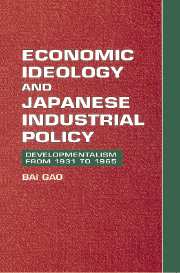Book contents
- Frontmatter
- Contents
- Acknowledgments
- List of abbreviations
- Note on Japanese usage
- 1 Introduction
- 2 The Ideology of Japanese developmentalism
- 3 The managed economy
- 4 Priority production
- 5 Promoting exports
- 6 High growth and liberalization
- 7 The institutional environment of economic reasoning
- Epilogue: Japanese developmentalism in historical perspective
- References in English
- References in Japanese
- Index
2 - The Ideology of Japanese developmentalism
Published online by Cambridge University Press: 29 March 2010
- Frontmatter
- Contents
- Acknowledgments
- List of abbreviations
- Note on Japanese usage
- 1 Introduction
- 2 The Ideology of Japanese developmentalism
- 3 The managed economy
- 4 Priority production
- 5 Promoting exports
- 6 High growth and liberalization
- 7 The institutional environment of economic reasoning
- Epilogue: Japanese developmentalism in historical perspective
- References in English
- References in Japanese
- Index
Summary
Until very recently, the economic ideology that inspired Japanese industrial policy has been largely neglected in social science discussions in English-speaking countries (but see Pyle 1974). It was widely believed that the Japanese experience of economic development had little intellectual foundation. Not only does every educated person in North America know that Western mainstream economics is largely irrelevant to the study of Japanese-type economies, even specialists in Japanese studies believe that neither academic nor government economists played a major role in Japan's high-growth strategy. Academia in general has long indulged in what Saitō Seiichirō (1981:298) calls “a fallacious contrast between the prosperity of the Japanese economy and the desolation of Japanese economics.”
These perceptions may be correct in the sense that neoclassical economics has not exerted any notable influence on Japanese development. Academicians, however, have neglected the fact that a group of Japanese economists represented by Arisawa Hiromi (1896–1988), Nakayama Ichirō (1898–1980), and Tōbata Seiichi (1899–1983), who belonged to the generation educated before World War II, played a very important role in the state's policy making. These economists helped the nation to establish an urgent agenda, to identify the future direction of economic development, and to build a theoretical framework for Japan's industrial policy in the context of international pressures and domestic turmoil from the 1930s to the 1960s. Their major propositions, reflected in successive state policies, constituted the core of what Japanese economist Kanamori Hisao (1985:127) calls “Jissen-ha economics” (the economics of actual fighting) – the logic of Japanese industrial policy.
- Type
- Chapter
- Information
- Economic Ideology and Japanese Industrial PolicyDevelopmentalism from 1931 to 1965, pp. 18 - 66Publisher: Cambridge University PressPrint publication year: 1997



